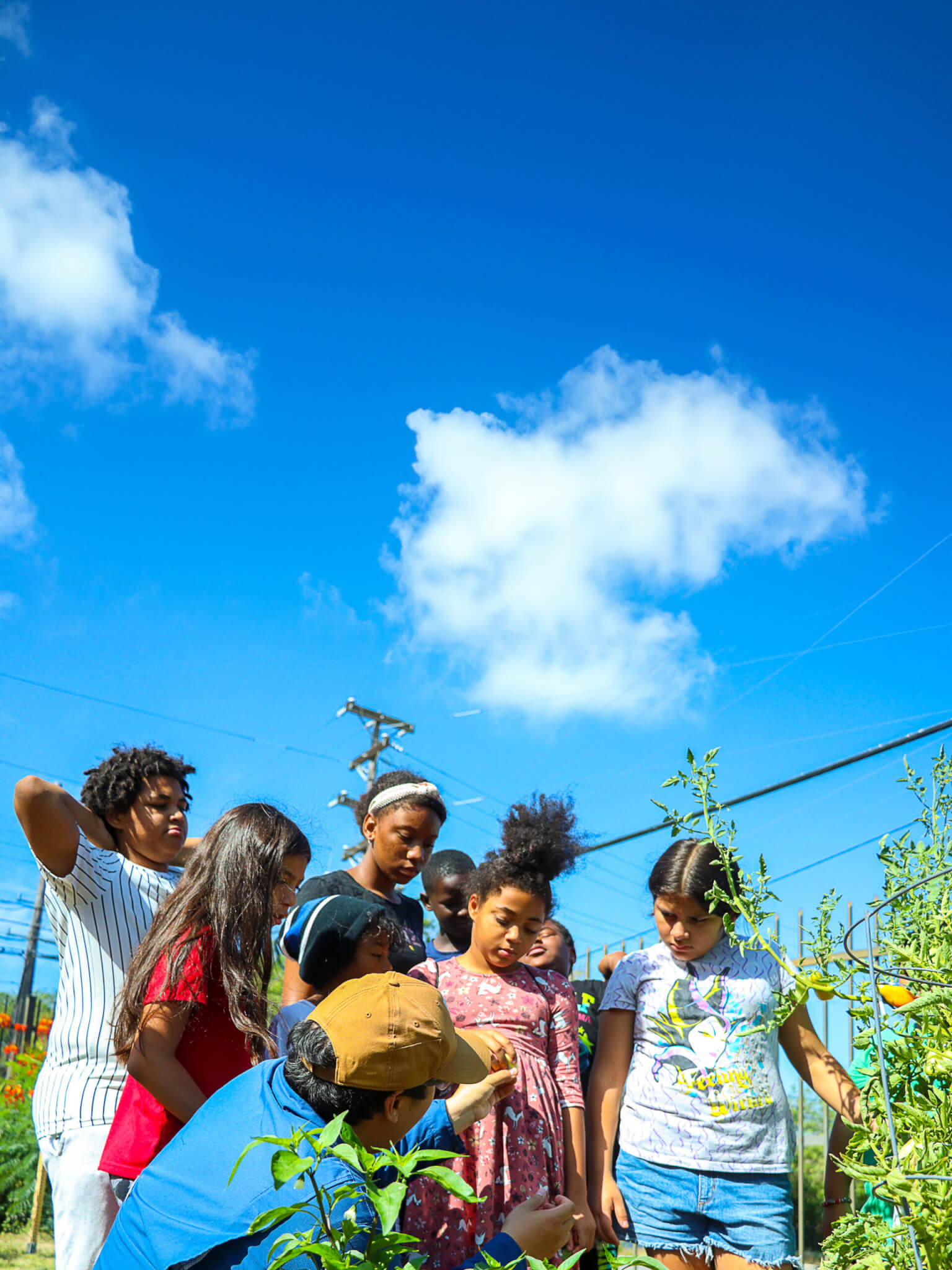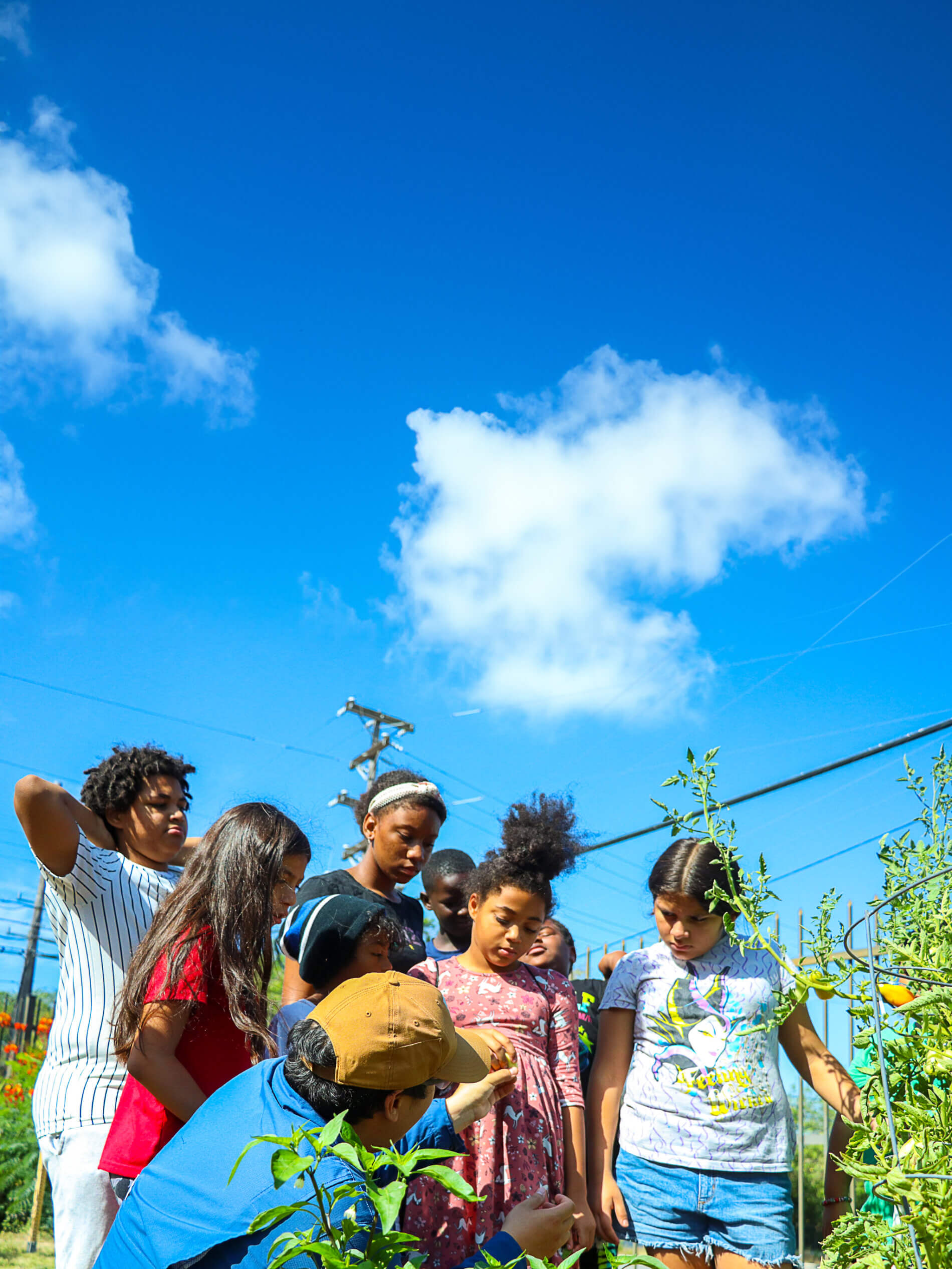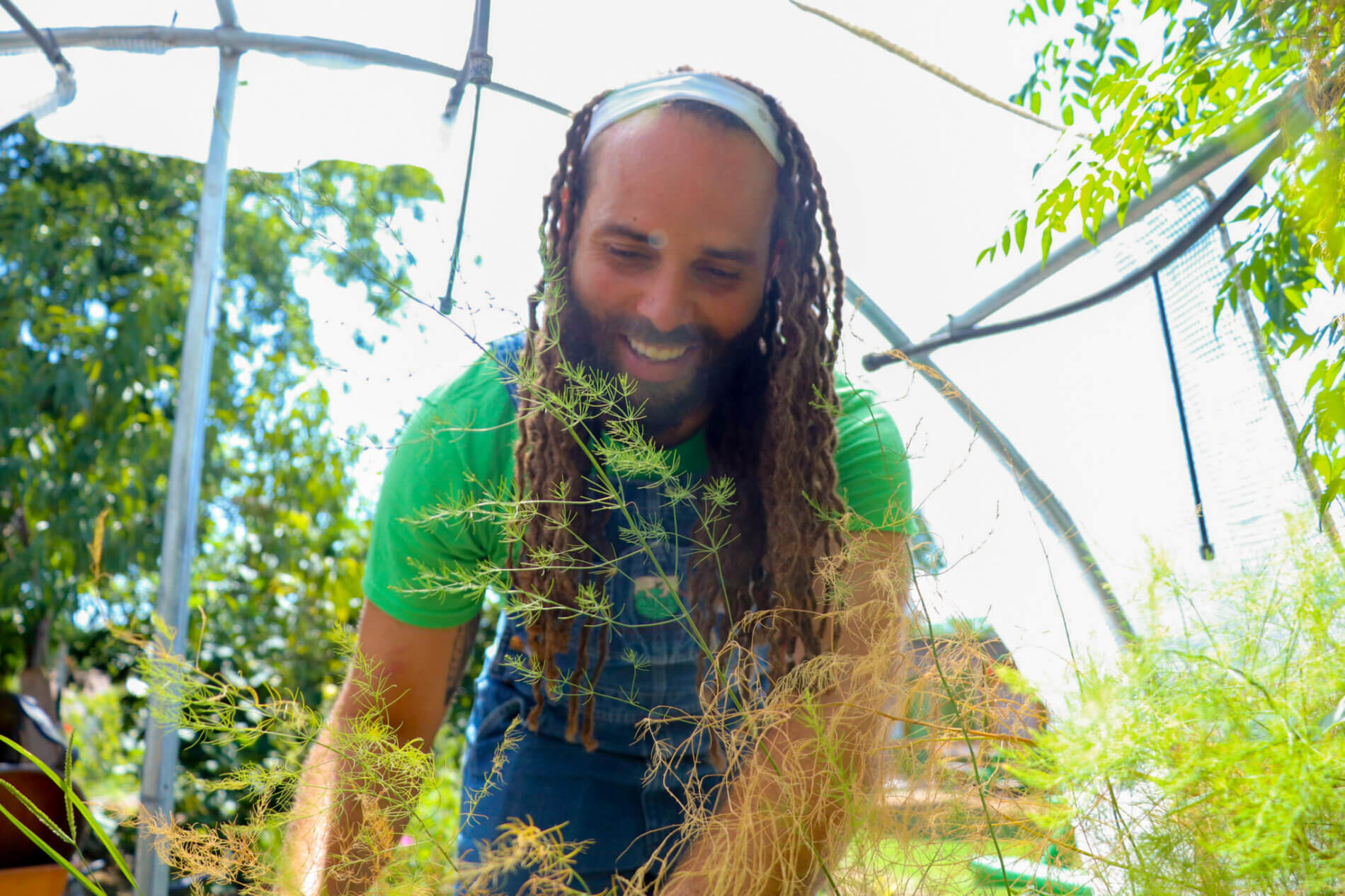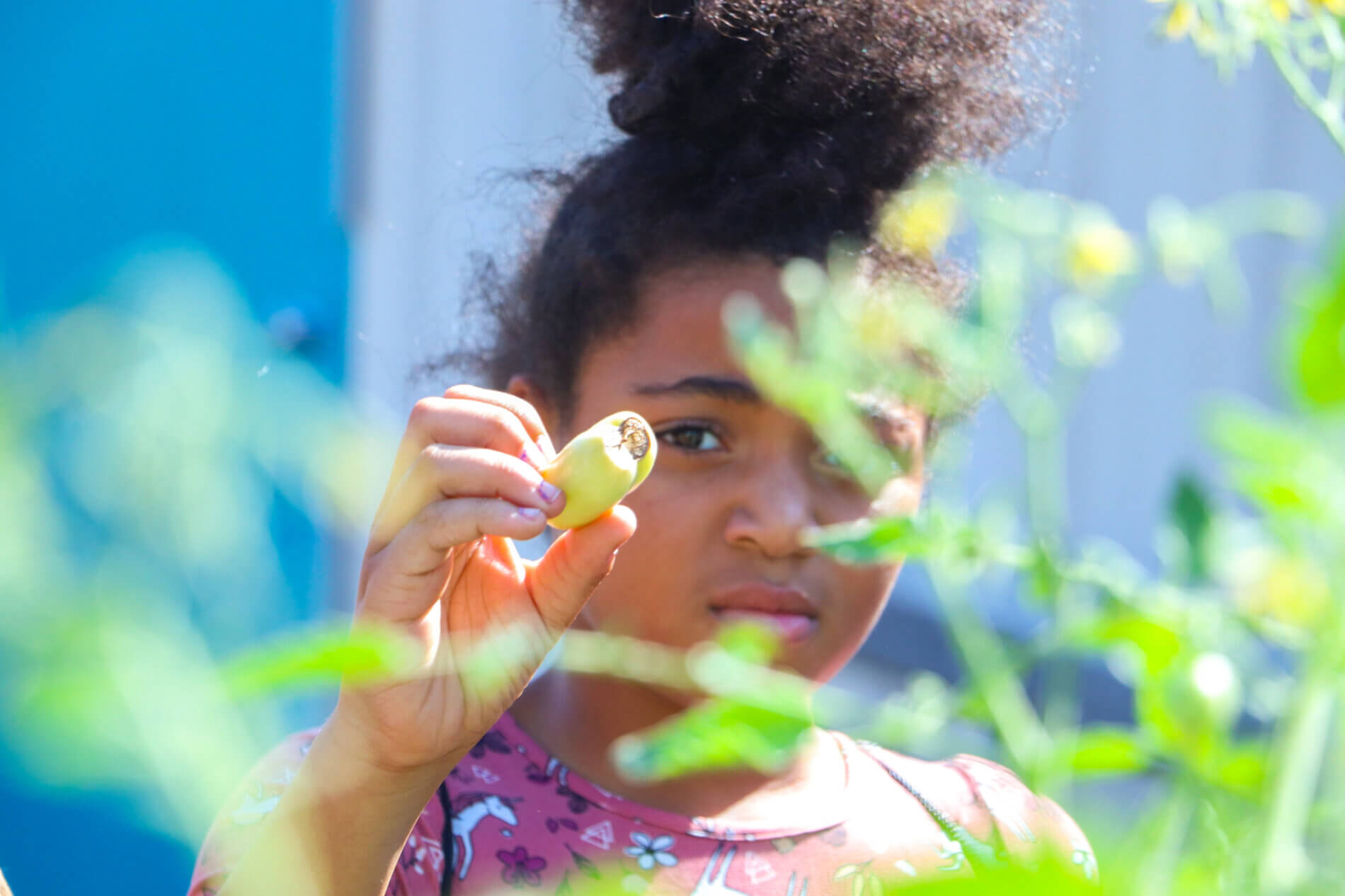

| It’s 9:00 a.m. on a Thursday morning, the summer heat hasn’t overtaken the day yet, and a class of curious three-year-olds are pushing their mini red and yellow wheelbarrows around a preschool garden. |
|---|
Ashton Ellis, who works as a garden educator with Gardopia Gardens, visits Blessed Sacrament Academy in San Antonio every Wednesday and Thursday to teach the young kids about gardening and produce, and to maintain the beautiful outdoor space he has helped cultivate.
This is the Gardopia model—teaching communities (yes, even the three-year-olds) to be healthier and to be good stewards of the planet through garden-based learning.
| This is the Gardopia model—teaching communities (yes, even the three-year-olds) to be healthier and to be good stewards of the planet through garden-based learning. |
|---|
“Plus, when you eat something straight off the vine, it’s just different,” said Stephen Lucke, Gardopia Gardens founder and CEO.
Lucke’s interest in health and wellness started at the University of Incarnate Word where he first received a Bachelor of Science degree in biochemistry and then a master’s degree in nutrition. In fact, his Intro to Nutrition course back in 2010 started it all. Lucke was inspired to begin a wellness program on campus that held seminars on nutrition and exercise. By 2012, Lucke had transitioned into growing food, starting his first community garden right there at the university.
A San Antonio native, Lucke told his professors that he wanted to serve his community, and by 2013, the Ettling Center for Civic Leadership at UIW helped fund a garden at the historic Ella Austin Community Center—Lucke’s first project outside of the university.
Lucke believes the public health crisis is one of the biggest challenges facing young people today. According to UT Health San Antonio, one in six people in San Antonio are estimated to have Type 2 Diabetes, and one in three people are estimated to have prediabetes.
But diabetes is also concentrated within certain neighborhoods. A recent report by the City of San Antonio Metropolitan Health District shows the highest diabetes hospitalization rates are found in ZIP codes like 78202, 78207, 78208, and 78211—ZIP codes that, according to the San Antonio Report, are the top four in San Antonio when it comes to poverty, unemployment, and education outcomes.
Because many of these neighborhoods were racially segregated and cut off from city services in the 1930s, economic disparity has affected minority communities disproportionately—27% of Black and Hispanic children are obese and at risk of developing diabetes, while only 12% of white children are obese in Bexar County. “We want to serve areas of high need in San Antonio,” Lucke said. “ZIP codes like 78207 and 78208.” 78202 is exactly where you’ll find Gardopia’s headquarters and the Ella Austin Community Center, where Gardopia still manages the community garden and teaches classes.
If you sat in on one of these classes, you might learn about the bacteria and fungus found in compost, or how long it takes a glass bottle to decompose (a quick 5,000 years), or you might see a young girl remove her headphones to hear the quiet chirp of a chick that’s about to hatch.

Thanks to Lucke, these garden-based classes are also held in schools all over the city. Gardopia teaches in 25 San Antonio schools weekly, reaching 2,000 kids a week, and should be in 40 schools within a year. Between classes, field trips, special events, farmers markets, and garden maintenance, Gardopia Gardens is busy and thriving.
They also host weekly Volunteer Saturdays, when families help tend the community gardens. You would think that the leafy produce wouldn’t fly with the kids, but according to Lucke, “When kids grow kale, kids eat kale. I’ve witnessed it over and over again.”
| “When kids grow kale, kids eat kale. I’ve witnessed it over and over again.” |
|---|

Lucke is glad to see that public perception of gardening has changed in recent years. “Pre-Covid, gardening was considered more of a hobby, just a fun thing to do,” he explained. “During Covid, with food supply chain issues and seeing the impact we had on our climate, people started to take gardening more seriously … maybe we should be a little healthier, maybe we should take care of our planet.”
The passion Lucke feels for the health of his community made Gardopia Gardens a prime participant in the H. E. Butt Foundation’s 2022-2023 Peer Learning Cohort. According to Lucke, the cohort has brought Gardopia’s vision further into focus and helped create practical plans revolving around impact accountability, board and staff fundraising, and professional development.
Recently, Lucke was even selected as a 2023 Aspen Institute Healthy Communities fellow. The nationwide fellowship aims to coach and equip local leaders to drive change in their communities.
Today, Gardopia Gardens has two full-time staff, including Lucke, and 15 part-time garden stewards and educators. Lucke even hopes they’ll someday own the property that the nonprofit’s headquarters is on.
“We would really like to purchase the property,” Lucke said. “When we first got there in 2015, it was worth $34,000. Then it doubled to $80,000. This year it jumped to $200,000.” Over the last 8 years, Gardopia has struggled to raise the capital to purchase the property, but they recently put in a grant application for $150,000 and are raising a capital campaign to get close to the $200,000 goal by the end of the year.
Lucke hopes to use the new outdoor kitchen being installed at Gardopia’s headquarters to host fun (and healthy!) fundraising dinners, but also free community dinners once a month with local chefs using the space for healthy cooking demonstrations.
| “Everyone knows the saying, ‘Give a man a fish, feed him for a day. Teach a man to fish, feed him for a lifetime.’ But teach a man to grow broccoli, and you can feed a community,” says Lucke. |
|---|